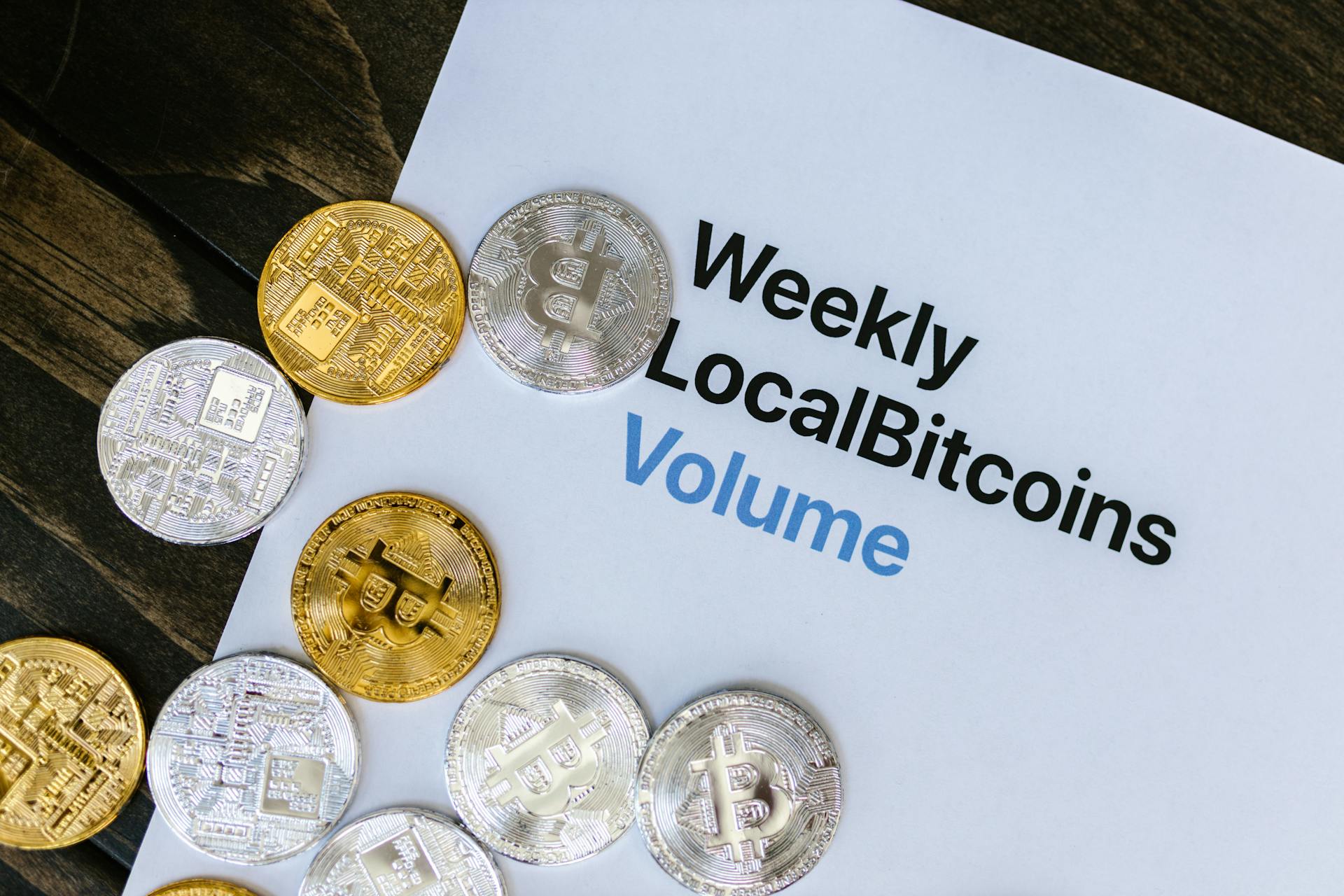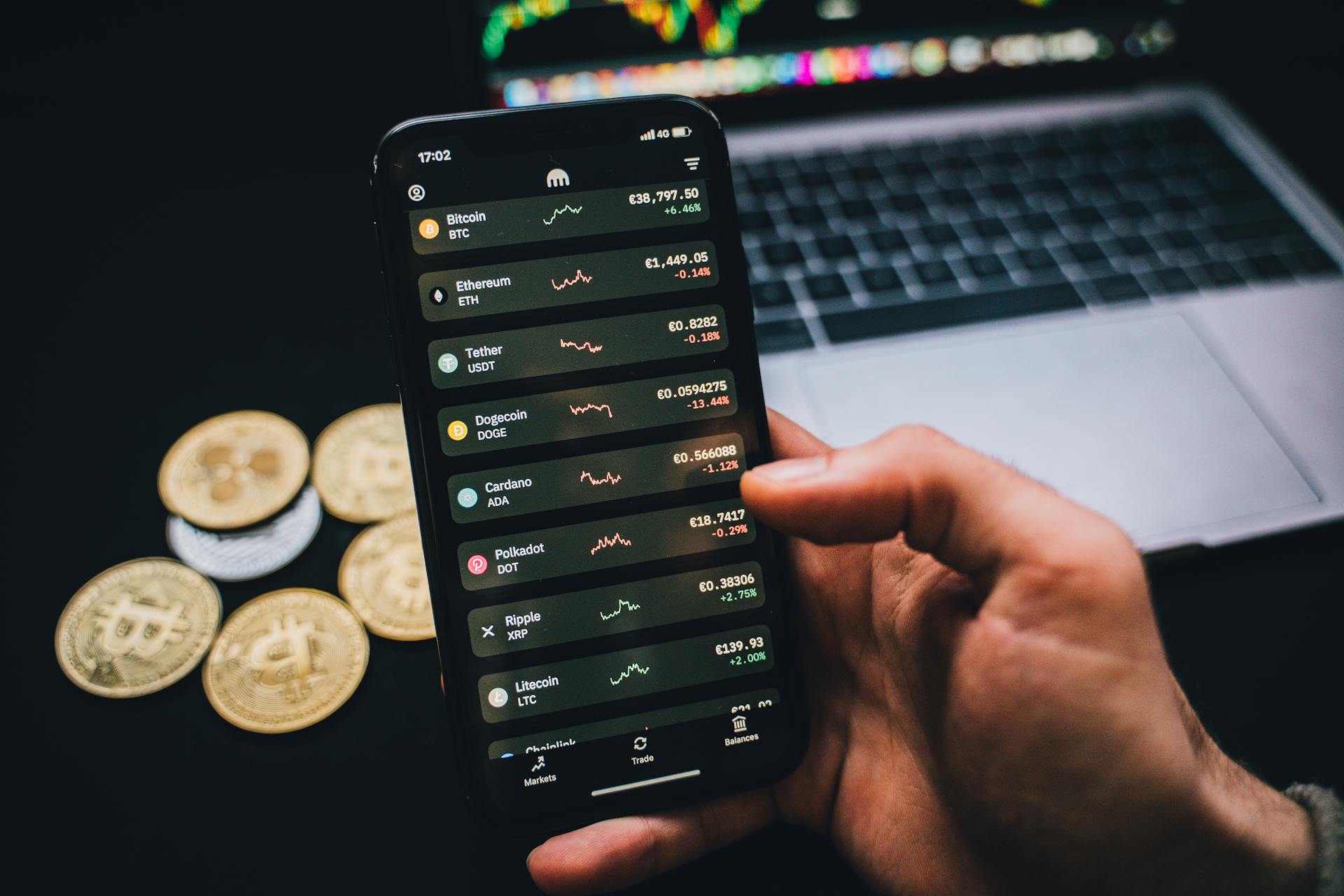
As a Muslim investor, it's natural to wonder if ETFs are halal. In fact, many Muslim investors have raised concerns about the Islamic permissibility of ETFs due to their underlying assets and investment strategies.
Some ETFs hold shares of companies that engage in haram activities, such as interest-based lending or gambling. For example, an ETF that tracks a stock market index may include companies that operate casinos or engage in usury.
However, it's worth noting that many ETFs are designed to be Shariah-compliant, meaning they adhere to Islamic principles and avoid haram activities. These ETFs often focus on sectors such as Islamic finance, halal industries, or socially responsible investing.
The key is to do your research and choose an ETF that aligns with your values and investment goals.
Discover more: Is Forex Currency Trading Halal
Halal Investing Definition
Halal investing requires investment decisions to be made in accordance with Islamic principles, which is a faith-based approach to investment management. This means considering Halal investing as a category of ethical or socially responsible investing.
Check this out: Are Index Funds Halal
Investors who practice Halal investing aim to avoid any activities that are considered haram, or forbidden, in Islam. This includes avoiding bonds and other interest-based investments, which are considered riba.
Halal investing is not just about avoiding certain investments, but also about making conscious choices that align with Islamic values. For example, investors may choose to invest in Sharia-compliant bonds, also known as sukuk.
To make Halal investing more accessible, some financial institutions offer Sharia-certified ETFs. These ETFs have been reviewed and certified to ensure they meet Islamic investment principles.
Here is a list of some Sharia-certified ETFs to consider:
- iShares MSCI World Islamic UCITS ETF
- iShares MSCI EM Islamic UCITS ETF
- iShares MSCI USA Islamic UCITS ETF
- Wahed FTSE USA Shariah ETF
- SP Funds Dow Jones Global Sukuk ETF
- SP Funds S&P 500 Sharia Industry Exclusions ETF
- Wealthsimple Shariah World Equity Index ETF
- SP Funds S&P Global REIT Sharia ETF
- Almalia Sanlam Active Shariah Global Equity UCITS ETF
It's essential to note that not all of these ETFs may be available in your region, and it's crucial to do your own due diligence before investing.
Sharia-Compliant Investing
Sharia-compliant investing is a way of investing that adheres to Islamic principles and laws. This type of investing is also known as Halal investing.
Investors who practice Sharia-compliant investing avoid receiving riba, or interest, which is considered a sin in Islam. They also steer clear of bonds and other interest-based investments.
Sharia-compliant investing prohibits stocks in companies with high debt and those in industries that don't align with Islamic principles. This includes companies involved in liquor, gambling, pornography, pork, insurance, and banks.
There are four main things that are prohibited in Sharia-compliant investing: bonds and other interest-based investments, stocks in companies with high debt, stocks in companies in industries that don't adhere to Islamic principles, and derivatives such as options and futures.
Even Halal stocks may require purification dues, which is essentially donating a portion of the impure income to charity.
If a fund contains a small number of non-compliant companies or assets (less than 5%), it is still considered Halal to invest in, but the profits should be purified by giving that percentage away in charity.
There are several Sharia-certified ETFs available, but it's essential to do your own due diligence and ensure they align with your investment goals and values.
You might like: Is Bank Interest Haram in Islam
Here are some Sharia-certified ETFs to consider:
- iShares MSCI World Islamic UCITS ETF
- iShares MSCI EM Islamic UCITS ETF
- iShares MSCI USA Islamic UCITS ETF
- Wahed FTSE USA Shariah ETF
- SP Funds Dow Jones Global Sukuk ETF
- SP Funds S&P 500 Sharia Industry Exclusions ETF
- Wealthsimple Shariah World Equity Index ETF
- SP Funds S&P Global REIT Sharia ETF
- Almalia Sanlam Active Shariah Global Equity UCITS ETF
It's worth noting that achieving Sharia compliance can be complex, with over 1,264 pages of guidelines to follow. Consider hiring a qualified advisor to help you maintain compliance with Sharia.
For another approach, see: Sharia Banking System
Islamic Investing Principles
Islamic investing principles are based on the concept of Shariah law, which prohibits certain activities such as receiving riba (interest) and engaging in maisir (speculation or gambling).
Four things are prohibited when it comes to investing in a Sharia-compliant way: bonds and other interest-based investments (riba), stocks in companies with high debt, stocks in companies in industries that do not adhere to Islamic principles, and derivatives such as options and futures (maisir).
Even Halal stocks may require you to pay “purification dues.” Essentially, you give the impure income away to charity. Typically, if a stock has less than 5% of its income from “impermissible sources,” it is considered OK to invest in, but you still have to pay purification dues on that impermissible income.
A fresh viewpoint: How Do Dividends Work with Etfs
Here are the four prohibited things in a list format:
- Bonds and other interest-based investments (riba)
- Stocks in companies with high debt
- Stocks in companies in industries that do not adhere to Islamic principles
- Derivatives such as options and futures (maisir)
This is a significant challenge for investors, as the vast majority of investments out there are not Halal.
Sharia-Certified Investments
Sharia-compliant or Halal investing requires investment decisions to be made in accordance with Islamic principles, primarily avoiding riba (interest-based investments).
To invest in a Sharia-compliant way, you can look for ETFs that have been certified as Sharia-compliant by scholars. These certified ETFs are a good starting point, but it's essential to verify the underlying assets and holdings to ensure they align with Islamic principles.
In practice, it's difficult for the average investor to manually screen stocks and shares ETFs, as they often have hundreds of holdings. For this reason, sticking to certified Halal ETFs is a more practical option until an automated solution can be developed to speed up the screening process.
Here's a list of some Sharia-certified ETFs to get you started:
- iShares MSCI World Islamic UCITS ETF
- iShares MSCI EM Islamic UCITS ETF
- iShares MSCI USA Islamic UCITS ETF
- Wahed FTSE USA Shariah ETF
- SP Funds Dow Jones Global Sukuk ETF
- SP Funds S&P 500 Sharia Industry Exclusions ETF
- Wealthsimple Shariah World Equity Index ETF
- SP Funds S&P Global REIT Sharia ETF
- Almalia Sanlam Active Shariah Global Equity UCITS ETF
Sukuk
Sukuk is a Sharia-compliant bond-like instrument that's gaining attention in the investment world. It's often referred to as an "Islamic bond." Sukuk represents an ownership interest in a pool of assets that generate revenue, which is then distributed to the Sukuk holders.
In a nutshell, Sukuk is a sharia-compliant alternative to conventional bond products. Sukuk ETFs have also been introduced, offering investors a way to tap into this market. The first ever Sukuk ETF was released in 2020, marking a significant development in this space.
Here are some key facts about Sukuk:
- Sukuk is a Sharia-compliant bond-like instrument.
- Sukuk represents an ownership interest in a pool of assets that generate revenue.
- Sukuk is a sharia-compliant alternative to conventional bond products.
- The first ever Sukuk ETF was released in 2020.
As Sukuk continues to grow in popularity, it's essential to understand its benefits and how it works. By investing in Sukuk, you're not only diversifying your portfolio but also adhering to Sharia-compliant principles.
Sharia-Certified Investments
Sharia-compliant investing is a way of investing that adheres to Islamic principles, primarily avoiding riba, or interest-based investments.
To find Sharia-certified investments, you can look for ETFs that have been certified as Sharia-compliant by scholars. Some examples of Sharia-certified ETFs include the iShares MSCI World Islamic UCITS ETF and the SP Funds Dow Jones Global Sukuk ETF.
You might enjoy: Shariah Compliant Etfs
Sharia-certified investments can be a great option for Muslims looking to invest their money in a way that aligns with their faith. However, it's essential to do your own due diligence and research the investment thoroughly before making a decision.
If you're interested in investing in Sharia-certified ETFs, you can consider the following options: the iShares MSCI EM Islamic UCITS ETF, the iShares MSCI USA Islamic UCITS ETF, the Wahed FTSE USA Shariah ETF, and the Wealthsimple Shariah World Equity Index ETF.
Here are some Sharia-certified ETFs to get you started:
Investment Products
Investment products can be a bit confusing, but let's break it down. Sharia-compliant or Halal investing means not receiving riba, which is a key principle of Islam.
If you're interested in ETFs, you'll want to look for ones that have been certified as Sharia-compliant by scholars. This is the easiest way to ensure the ETF meets your requirements.
However, if you can't find a certified ETF, you'll need to do a manual check. This involves verifying that the ETF holds the underlying assets and not just creating a synthetic effect using derivative instruments.
For another approach, see: Sharia Compliant Finance
To do a manual check, you'll need to determine whether all the companies or assets in a fund are Halal. If so, then the entire ETF is Halal. But if the fund contains a small number of non-compliant companies or assets (less than 5%), you can still invest in it, but you should purify your profits by giving that percentage away in charity.
Here's a list of Sharia-certified ETFs to get you started:
- iShares MSCI World Islamic UCITS ETF
- iShares MSCI EM Islamic UCITS ETF
- iShares MSCI USA Islamic UCITS ETF
- Wahed FTSE USA Shariah ETF
- SP Funds Dow Jones Global Sukuk ETF
- SP Funds S&P 500 Sharia Industry Exclusions ETF
- Wealthsimple Shariah World Equity Index ETF
- SP Funds S&P Global REIT Sharia ETF
- Almalia Sanlam Active Shariah Global Equity UCITS ETF
Remember to do your own due diligence and check if these ETFs are available in your region.
ETFs and Fees
ETFs tend to charge less in fees compared to normal funds because they are more passively managed.
Total Expense Ratio (TER) is a key fee to look out for, covering all annual management, trading, and admin costs, which typically range from 0.3% to 0.7%.
You might also incur foreign exchange fees if you buy an ETF in a different currency.
Broaden your view: Stock Broker Fees
It's essential to consider these fees when choosing an ETF to ensure they align with your investment goals and budget.
Here's a breakdown of the two main fee types to watch out for:
Frequently Asked Questions
Is qqq ETF halal?
QQQ ETF is not entirely halal due to non-Shariah-compliant holdings. Approximately 9.90% of its holdings are filtered out, but the remaining 90.10% may still be suitable for halal investors
Sources
- https://www.whitecoatinvestor.com/halal-investing/
- https://fundingsouq.com/ae/en/blog/etf-halal-investment-guide/
- https://www.hejazfs.com.au/halal-etfs/
- https://www.bursamalaysia.com/trade/our_products_services/islamic_market/bursa_malaysia_i/shariah_compliant_exchange_traded_funds
- https://www.islamicfinanceguru.com/articles/the-complete-guide-to-halal-etf-investing-for-muslim-investors
Featured Images: pexels.com

